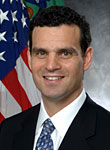Alum's advice: Join 'city hall,' learn to write, develop good habits, don't whine or sweat it
By Joseph Mansky

To really effect change, don't fight city hall, but join it, stressed David S. Cohen '85, undersecretary of the U.S. Treasury for terrorism and financial intelligence since June.
Speaking on campus Nov. 4 as part of the Munschauer Career Series in Goldwin Smith Hall, Cohen said that while he was an undergraduate, a group of activists camped outside of Day Hall to "get Cornell and other universities to pull their money out of South Africa."
But these days, as part of "city hall," "I get the opportunity to use my values, my ideas, my notions of the way our sanctions programs ought to operate and to put that into effect," he said -- something he would not have been able to do if he "had stayed on the outside" like the activists camping out in the makeshift "shantytown" outside Day Hall.
Cohen, a government major at Cornell, said that he runs "the Treasury Department's policymaking, regulatory and enforcement functions that are designed to combat what we call illicit finance": financial support for terrorist organizations, nuclear weapons proliferation, narcotics traffickers and transnational criminal organizations.
On the defense side, "we're responsible for all of the domestic anti-money laundering regulations," Cohen said. "The cooler part of my job" is offense, he added, "trying to figure out how these financial support networks operate" and taking action to disrupt them. Among the department's recent successes have been "driving out of the formal financial sector support for al Qaeda" and applying "comprehensive sanctions on Libya and Qaddafi," freezing a total of $37 billion of assets in the United States.
Looking back, Cohen admitted that he had no idea where he would be today when he graduated from Cornell 26 years ago. "The important point," he said, is "don't sweat it too much." Although "there are things you can do to improve your chances to get where you want to go," he said, "you're not going to figure it out no matter how hard you try to look forward."
After graduating from Yale Law School, Cohen began what he called "the pretty traditional legal career" of clerking for a judge and working in litigation. He joined the Treasury Department in 1999 after a friend invited him, and although he left two years later, he returned under the Obama administration in 2009.
Yet Cohen admitted that "dumb luck" has played a role, too.
"I am still convinced that I have been enormously lucky," he noted, but "luck is the residue of design. … There are things that you can do to improve your luck," he added, such as working hard, acquiring technical knowledge and, most importantly, developing "certain habits and ways of doing things."
Cohen said that he developed many of these habits at Cornell. "It is critically important to be a good colleague," he observed, quoting his boss Treasury Secretary Tim Geithner: "no jerks, no whiners and no peacocks." In addition, Cohen advised the students in the audience to "be long-term focused."
"Learn how to write," Cohen offered as one of two final pieces of advice. "There is nothing more important or nothing that can kill your career more than turning out bad written product." He closed by reminding the audience, "Don't forget about your families as you go about building your career," since "there is nothing in a career that is as enjoyable and rewarding as your family."
Joseph Mansky '12 is a writer intern for the Cornell Chronicle.
Media Contact
Get Cornell news delivered right to your inbox.
Subscribe